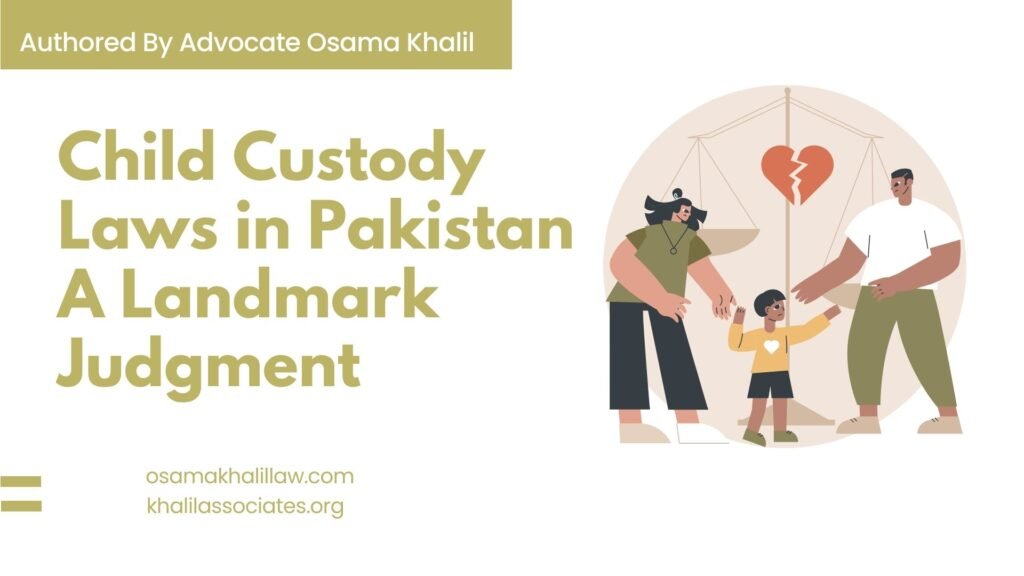
A recent decision by the Lahore High Court (Multan Bench) has clarified child custody in Pakistan and adoption laws under Islamic law. The case of Mst. Arzu vs. District Police Officer, Khanewal & Others focused on a minor child given up for adoption but later claimed by his biological mother. This ruling highlights the importance of biological parentage in deciding custody matters.
Case Background – Child Custody in Pakistan
Mst. Arzu filed a petition under Article 199 of the Constitution of Pakistan and Section 491 of the Criminal Procedure Code (CrPC) to regain custody of her son, Muhammad Ans. She claimed to be his biological mother, while Rasheed Ahmad, the respondent, had adopted him. To confirm her claim, the court ordered a DNA test at the Punjab Forensic Science Agency.
Court’s View on Adoption in Islam
The DNA test proved that Mst. Arzu was the biological mother of Muhammad Ans. The court then examined adoption laws in Islam. It explained that adoption provides care and shelter but does not replace the child’s real lineage. Under Islamic law:
- Adoption does not grant the same rights as biological parenthood.
- The child’s legal identity must stay linked to their real parents.
- Adoption does not create inheritance or guardianship rights.
Legal Ruling
After confirming maternity through DNA, the court ruled in favor of Mst. Arzu and ordered her son’s return. The judgment clarified that although the Guardian Court handles child custody cases, the High Court can intervene in urgent matters for immediate relief.
The court also stated that when a child’s welfare is at risk, the High Court can place them with their biological parent until the Guardian Court gives a final verdict.
Precedents and Legal References
The court referred to key judgments, including:
- Mirjam Aberras Lehdeaho v. SHO Police Station Chung, Lahore (2018 SCMR 427)
- Ahmed Sami v. Saadia Ahmed (1996 SCMR 268)
- Shaukat Masih v. Mst. Farhat Parkash (2015 SCMR 731)
- Muhammad Khalil-ur-Rehman v. Mst. Shabana Rahman (PLD 1995 SC 633)
- Mst. Nadia Perveen v. Mst. Almas Noreen (PLD 2012 SC 758)
These cases confirm that adoption cannot replace biological parentage and that custody decisions must focus on the child’s well-being while respecting Islamic principles.
Adoption in Islamic History – Child Custody in Pakistan
The judgment also discussed historical adoption examples in Islam, such as:
- Hazrat Zaid bin Harisa (R.A.), initially called Zaid bin Muhammad, was later linked back to his real family.
- Hazrat Jaafar (R.A.), who took care of Hazrat Hamza’s daughter after his martyrdom.
- The Holy Virgin Mary (P.B.U.H.), raised by Prophet Zakariya (P.B.U.H.).
These examples show that Islam encourages caring for orphans but maintains the importance of biological lineage.
Impact on Child Custody Cases in Pakistan
This judgment clarifies adoption and custody laws in Pakistan. It confirms that adoptive parents cannot take away legal rights from biological parents. However, adoption remains encouraged, provided people understand its legal boundaries.
For anyone considering adoption or facing a custody battle, this case offers a clear legal guide to parental rights in Pakistan.
Conclusion
The Lahore High Court’s ruling in Mst. Arzu vs. District Police Officer, Khanewal & Others confirms that biological parentage plays a crucial role in child custody cases. Adoption is a noble act, but it does not change a child’s legal identity. This decision sets a strong legal foundation for future adoption and custody cases in Pakistan, ensuring that children’s rights stay protected while following Islamic legal principles.
Anyone dealing with custody issues should seek legal advice to understand Pakistani law better. Focusing on the child’s best interests must always remain the top priority.
